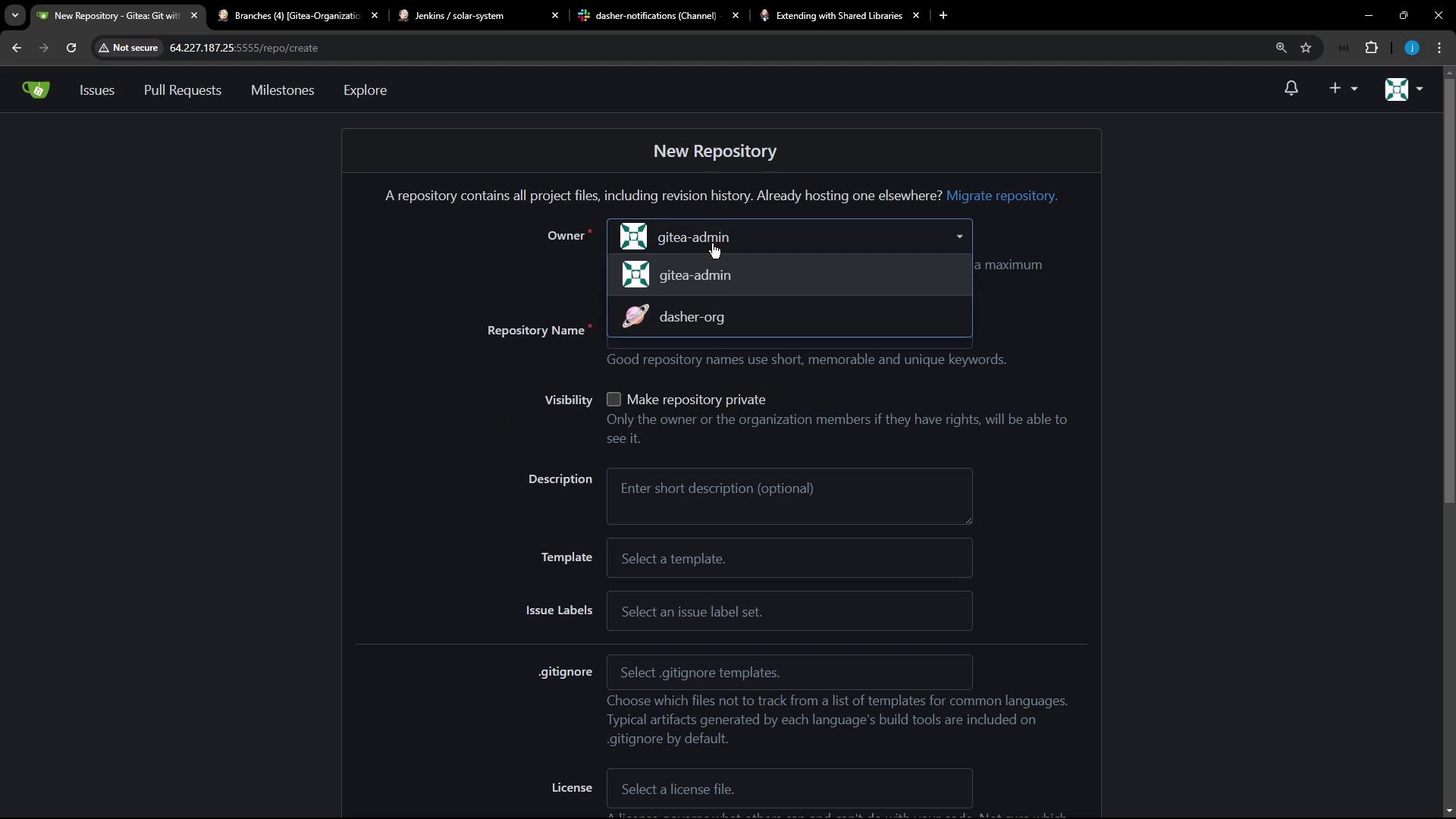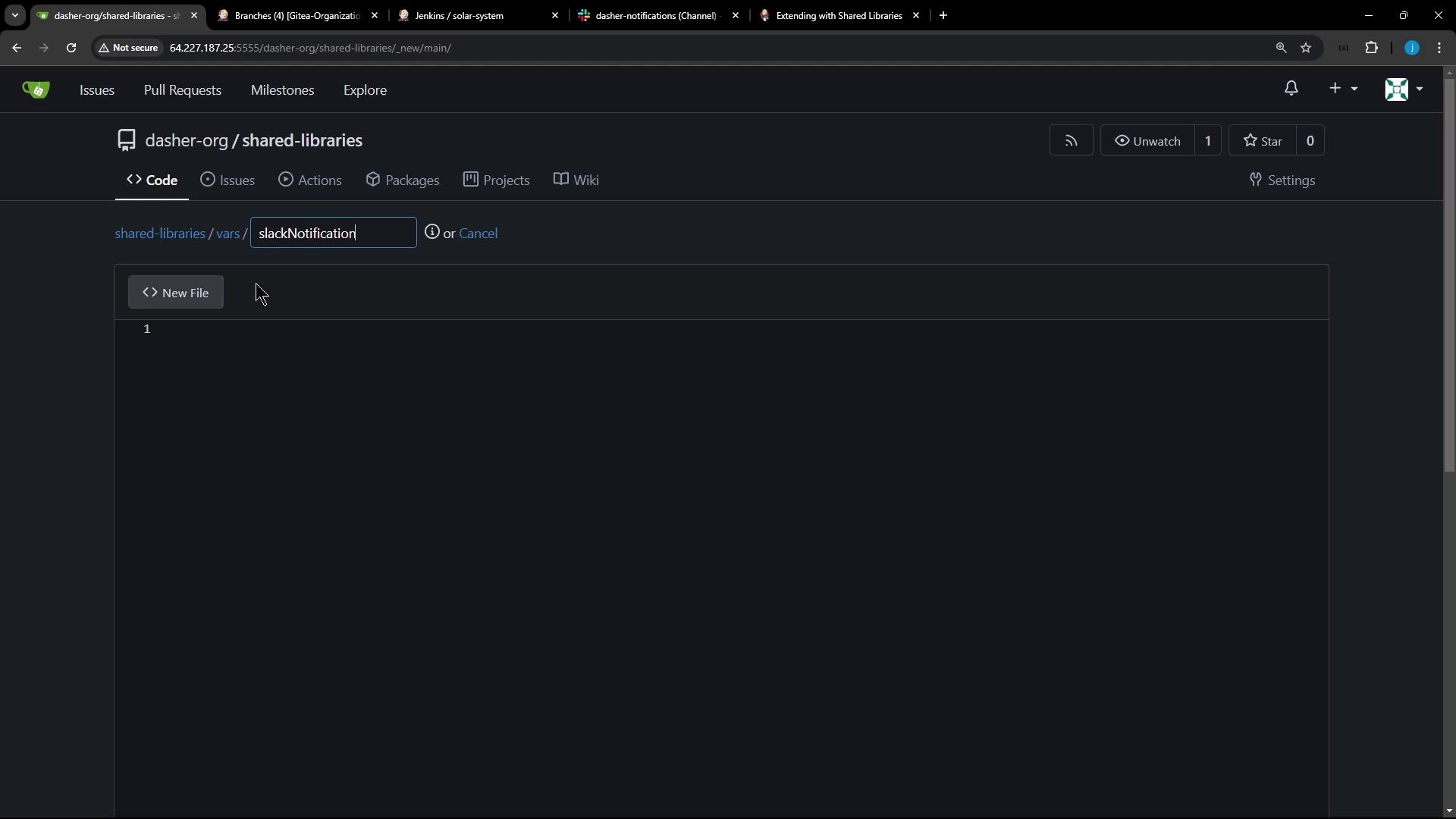Advanced Jenkins
Shared Libraries in Jenkins
Create a Shared Library for Slack Notification
In this guide, you’ll learn how to extract Slack notification logic from a Jenkinsfile into a reusable Shared Library. By the end, any pipeline in your organization can send Slack updates with a single method call.
Why Refactor Slack Notifications?
Embedding Slack logic directly in each Jenkinsfile leads to:
- Duplication across repositories
- Harder maintenance when updating message formats
- Inconsistent notification behavior
By centralizing the code in a Shared Library, you maintain one source of truth and simplify pipeline scripts.
Current Jenkinsfile Implementation
Here’s a typical approach you might find in your project (e.g., the Solar System repository):
def slackNotificationMethod(String buildStatus = 'STARTED') {
buildStatus = buildStatus ?: 'SUCCESS'
def color
if (buildStatus == 'SUCCESS') {
color = '#47ec05'
} else if (buildStatus == 'UNSTABLE') {
color = '#d5ee0d'
} else {
color = '#ec2805'
}
def msg = "${buildStatus}: *${env.JOB_NAME}* #${env.BUILD_NUMBER}:\n${env.BUILD_URL}"
slackSend(color: color, message: msg)
}
pipeline {
agent any
// ...
}
While functional, this code is locked to a single repository and must be copied everywhere you need it.
Benefits of a Shared Library
| Benefit | Description |
|---|---|
| Single Source of Truth | Update message format or colors in one place, apply everywhere |
| Simplified Jenkinsfiles | Pipelines call SlackNotification(...) instead of inlining Groovy logic |
| Better Collaboration | Teams can contribute improvements to notifications without touching individual repos |
1. Create the Git Repository
On your Git hosting platform (e.g., Gitea), create a new repository for your Shared Libraries.
For example, under the dasher-org organization name it shared-libraries.

2. Initialize the Repository
Clone and prepare the repo locally:
git init
git checkout -b main
touch README.md
git add README.md
git commit -m "Initial commit for Shared Libraries"
git remote add origin http://64.227.187.25:5555/dasher-org/shared-libraries.git
git push -u origin main
For full details on directory layout and configuration, see the Jenkins Shared Libraries documentation.
3. Define the Directory Structure
A standard Shared Library uses this layout:
shared-libraries/
├── vars/
│ └── SlackNotification.groovy # global step for Slack notifications
├── src/
│ └── org/
│ └── foo/
│ ├── Bar.groovy # org.foo.Bar class
│ ├── foo.groovy # global 'foo' variable
│ └── foo.txt # help text for 'foo'
└── resources/
└── org/
└── foo/
└── Bar.json # static helper data
4. Add the Slack Notification Script
Create vars/SlackNotification.groovy via your Git hosting UI or locally:

Paste the extracted logic, rename the entry method to call so Jenkins treats it like a native step:
// vars/SlackNotification.groovy
def call(String buildStatus = 'STARTED') {
buildStatus = buildStatus ?: 'SUCCESS'
def color
if (buildStatus == 'SUCCESS') {
color = '#47ec05'
} else if (buildStatus == 'UNSTABLE') {
color = '#d5ee0d'
} else {
color = '#ec2805'
}
def msg = "${buildStatus}: ${env.JOB_NAME} #${env.BUILD_NUMBER}:\n${env.BUILD_URL}"
slackSend(color: color, message: msg)
}
Note
Defining call in the vars directory lets you invoke SlackNotification(...) directly in any pipeline stage.
5. How the call Method Works
Jenkins treats each Groovy script in vars/ with a call method as a pipeline step. For instance, vars/sayHello.groovy:
// vars/sayHello.groovy
def call(String name = 'human') {
echo "Hello, ${name}."
}
You’d use it in a pipeline like:
pipeline {
agent any
stages {
stage('Greet') {
steps {
sayHello('Jenkins')
}
}
}
}
Likewise, after configuring your new Shared Library in Manage Jenkins → Configure System, invoke Slack notifications:
pipeline {
agent any
stages {
stage('Notify') {
steps {
SlackNotification('SUCCESS')
}
}
}
}
Warning
Ensure your Jenkins instance has the Slack Plugin installed and configured with valid credentials.
Next Steps
- Commit and push all changes to
shared-libraries. - Configure the Shared Library in Jenkins global settings:
- Library name:
shared-libraries - Default version:
main
- Library name:
- Update your pipelines to replace inline Slack logic with
SlackNotification(...).
Once configured, you’ll enjoy centralized, consistent Slack alerts across every Jenkins pipeline.
References
Watch Video
Watch video content